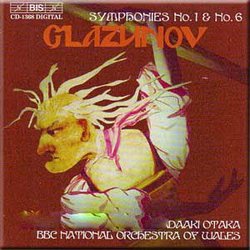| All Artists: Alexander Glazunov, Tadaaki Otaka, BBC National Orchestra of Wales Title: Glazunov: Symphonies Nos. 1 & 6 Members Wishing: 0 Total Copies: 0 Label: Bis Release Date: 6/24/2003 Album Type: Import Genre: Classical Style: Symphonies Number of Discs: 1 SwapaCD Credits: 1 UPCs: 675754619329, 7318590013687 |
Search - Alexander Glazunov, Tadaaki Otaka, BBC National Orchestra of Wales :: Glazunov: Symphonies Nos. 1 & 6
 | Alexander Glazunov, Tadaaki Otaka, BBC National Orchestra of Wales Glazunov: Symphonies Nos. 1 & 6 Genre: Classical
|
Larger Image |
CD Details |
CD ReviewsSome well-through readings of Glazunov's oeuvres. David A. Hollingsworth | Washington, DC USA | 06/30/2003 (4 out of 5 stars) "It's good to have two current ongoing series of Glazunov's symphonies and his miscellaneous shorter works. And while I'll confess a certain nostalgia I have towards the deleted classic Melodiya recordings, it's good and even gratifying that more recordings of this great Russian composer's music are being brought to the fore. With the ongoing BIS and Chandos series, there are gains as well as losses. The gains are that the Polyansky & Otaka accounts are in ways idiomatic & to an extent, fresh. Otaka's readings of Glazunov's First and Sixth Symphonies (on this disc) are of certain charismatic projection, not underpinning the drama and the heroics of the Symphonies while treating them as though Borodin's influences pervade at various points especially of the finale, which is actually the case. But the sensitivity Otaka in particular brings to the slow movements is rewarding. And in the masterful yet slightly flawed First Symphony of the precocious teenage composer, I like Otaka's portrayal of its Andante movement: it sounds innocent, yet serious. And the first movement goes well enough, if not as flowing and poetic as Svetlanov's, Fedoseyev's, or even Rozhdestvensky's vintage recordings. The delicacy Svetlanov brings to the Symphony may not be for everyone's taste, but he portrays the young Glazunov almost perfectly (the passionate, explosive passages in the Andante sound a bit deflated though). The theme et variations Andante movement of Glazunov's Sixth Symphony is nicely done under Otaka's hands. And while the first movement is a bit too spacious for my taste, Otaka never run the risk of flagging the music, with the climax (among Glazunov's strong suits) euphoniously well captured. But there are losses in these series as well, even when praises are indeed warrented. The Russian conductors (those mentioned above as well as Golovanov and Mravinsky) set standards that are not, for the most part, met. Examine Fedoseyev's approach of the Sixth if you can. Fedoseyev ways with this masterpiece bring out more not only of charisma, but also of the viviciousness that makes the score more of Tchaikovskian passion & dramatic sweep. And yet Fedoseyev continues to remind me that it was Glazunov who wrote this score. Golovanov does relatively the same thing in his classic 1948 recording as does Rozhdestvensky. And these recordings also remind me why even Rachmaninov praised this symphony wholeheartedly: not only did he transcribe the work for two pianos, he also conducted it on a number of occasions during his short tenure at the Bolshoi Theatre. Otaka's treatment of the finale is very good indeed, but Fedoseyev is better. The BBC National Orchestra of Wales performed with warmth, authority, and even admiration. But it's no match for the Russian orchestras in terms of raw poetry, sonority, and the liveliness in their playing that moves the listeners from within. The BIS compact disc is sonically superior to the Melodiya recordings. But in terms of passion and the advocacy of Glazunov's unfairly underrated music, the Russian orchestras then than now win hands down. So, while this disc is recommendable, it is not necessarily indispensible. Yondani Butt's ASV recording is still the best among the current versions of the Sixth, while Polyansky's account of the First is, as with Okaka, a safe option, but hardly anything more."
|

 Track Listings (8) - Disc #1
Track Listings (8) - Disc #1